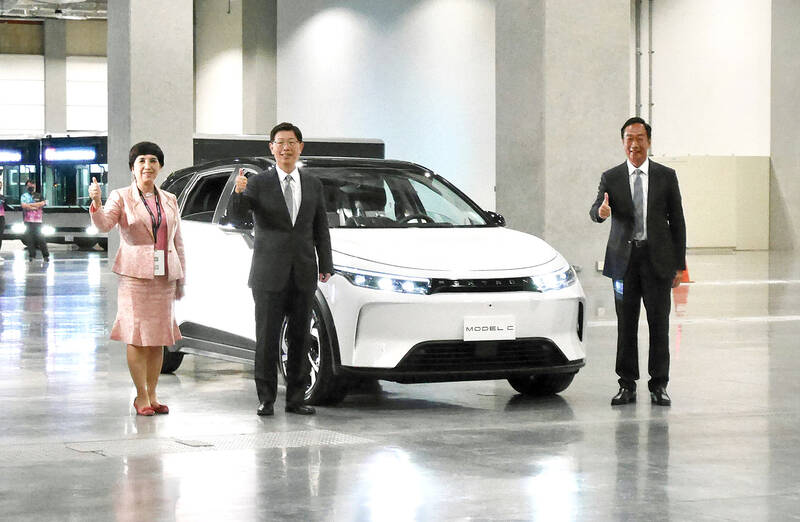Hon Hai Precision Industry Co (鴻海精密) yesterday added two new electric vehicle (EV) prototypes to its fleet, paving the way for the commercial production of the Model V and Model B in the US and Thailand in 2024.
The prototypes unveiled yesterday are a pickup truck and a sports hatchback vehicle.
Their addition shows Hon Hai’s determination to build a foothold in the global EV market as part of its efforts to diversify its product portfolio and reduce its reliance on the smartphone assembly business. The iPhone maker has developed five EV models over the past two years.

Photo: Fang Wei-jie, Taipei Times
Hon Hai operates a factory in Ohio with an installed capacity of 500,000 to 600,000 vehicles a year.
In Thailand, the company is collaborating with local partners to build facilities that could produce 150,000 to 200,000 battery-powered vehicles a year, Hon Hai chairman Young Liu (劉揚偉) told a media briefing following the EV launch in Taipei.
In contrast to its PC and smartphone manufacturing hubs in China, Hon Hai is expanding its EV footprint globally and seeking to deploy new manufacturing capacity in India and Indonesia with local partners through its “build, operate and localize” strategy, Liu said.
At home, Hon Hai is to work with Yulon Motors Co (裕隆汽車) to start volume production of the Model C next year, using Yulon’s factory in Miaoli County’s Sanyi Township (三義), Liu said.
Hon Hai yesterday released the production version of the Model C, after the prototype was unveiled one year ago.
The company’s goal of capturing a 5 percent share of the global EV market by 2025 still holds, Liu said.
Based on that goal, Hon Hai could generate NT$1 trillion (US$31.3 billion) in revenue from its EV business by 2025, excluding software products, Liu said.
In the longer term, Hon Hai aims to seize 43 percent of the global EV market, similar to its shares of the global PC and mobile phone markets, Liu said.
Asked about shipments from Hon Hai and Tesla Inc, Liu said Hon Hai hopes to one day produce EVs for the US-based automaker.
Hon Hai adopts a different business model from Tesla, he said.
Tesla is an electric vehicle brand, while Hon Hai provides electric vehicle design and manufacturing services on a contractual basis, he said.
Hon Hai would not compete with customers in selling its own-brand EVs, he said, adding that the company is a platform provider.
The company more than two years ago introduced the MIH open platform, which now has 2,749 members, he said.
Hon Hai aims to source more than half of its EV components from platform members, he added.
The company would only focus on making crucial components, such as silicon carbide (SiC) chips to boost the EV supply chain’s resilience, Liu said.
Hon Hai expects to complete customers’ certification for its SiC chips next year before shipping, he added.

Intel Corp chief executive officer Lip-Bu Tan (陳立武) is expected to meet with Taiwanese suppliers next month in conjunction with the opening of the Computex Taipei trade show, supply chain sources said on Monday. The visit, the first for Tan to Taiwan since assuming his new post last month, would be aimed at enhancing Intel’s ties with suppliers in Taiwan as he attempts to help turn around the struggling US chipmaker, the sources said. Tan is to hold a banquet to celebrate Intel’s 40-year presence in Taiwan before Computex opens on May 20 and invite dozens of Taiwanese suppliers to exchange views

Application-specific integrated circuit designer Faraday Technology Corp (智原) yesterday said that although revenue this quarter would decline 30 percent from last quarter, it retained its full-year forecast of revenue growth of 100 percent. The company attributed the quarterly drop to a slowdown in customers’ production of chips using Faraday’s advanced packaging technology. The company is still confident about its revenue growth this year, given its strong “design-win” — or the projects it won to help customers design their chips, Faraday president Steve Wang (王國雍) told an online earnings conference. “The design-win this year is better than we expected. We believe we will win

Chizuko Kimura has become the first female sushi chef in the world to win a Michelin star, fulfilling a promise she made to her dying husband to continue his legacy. The 54-year-old Japanese chef regained the Michelin star her late husband, Shunei Kimura, won three years ago for their Sushi Shunei restaurant in Paris. For Shunei Kimura, the star was a dream come true. However, the joy was short-lived. He died from cancer just three months later in June 2022. He was 65. The following year, the restaurant in the heart of Montmartre lost its star rating. Chizuko Kimura insisted that the new star is still down

While China’s leaders use their economic and political might to fight US President Donald Trump’s trade war “to the end,” its army of social media soldiers are embarking on a more humorous campaign online. Trump’s tariff blitz has seen Washington and Beijing impose eye-watering duties on imports from the other, fanning a standoff between the economic superpowers that has sparked global recession fears and sent markets into a tailspin. Trump says his policy is a response to years of being “ripped off” by other countries and aims to bring manufacturing to the US, forcing companies to employ US workers. However, China’s online warriors